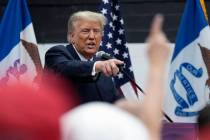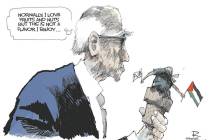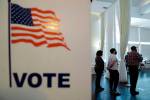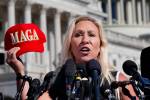The Big 60 looms large for Democrats
Thanks to Karl Rove, American politics are once again focusing on numbers.
But with due respect to the consultant who became President Bush's right-hand man, Rove is missing the forest for the trees when he talks about polls suggesting Barack Obama has "finally" crossed the 270 electoral vote threshold to be elected president.
Those who actually use the current polls in all of the battleground states have Obama at 350 electoral votes. After all, Rove's been off before. (Remember 2006?)
At any rate, the 2006 election is the best prologue for the number that really matters nationally (and more importantly, in Nevada).
Back in 2006, Harry Reid did his best all election year to downplay the Democrats' chances to retake Congress. By October, he was fairly sure Democrats would pick up four -- and maybe, just maybe, five seats -- in the Senate. At least that's what he would say publicly.
On Election Night, Reid suddenly had to start working the phones, building support within his caucus for his assumed ascendancy to majority leader. Democrats had defended all of their seats and had taken six away from Republicans. Not four. Not five. Six.
Reid's subsequent time as majority leader has been something of a disaster for him at home. Becoming the face of the Bush opposition, Reid reliably ticks off anyone who still proudly displays his Republican voter registration on his sleeve. And worse, he's rankled activists in his base and upset all of those Democratic voters around the country -- people from Virginia to Montana -- who now have Democratic senators but thought the 2006 vote was going to miraculously end the war in Iraq.
Reid has consistently responded to criticism from the blogs and the left by talking about the metrics of the Senate. His majority is the slimmest imaginable, he says. Joe Lieberman is never with him on the war and there's just no way to get anything done without 60 senators in his camp. That's the story Reid's been selling since rising to power after the 2006 elections.
He might want to dial back on that a little bit -- it might come back to haunt him.
I've talked to Reid three times this cycle about the Big 60. And each time he demurs when I ask him if he'll pick up the nine seats he needs to get there. But here we are, just 28 days from the election, and it's a real possibility that Democrats will turn the trick in the Senate this year. A new Minnesota poll suggests Al Franken might actually beat Norm Coleman, after all.
Even worse for the Republicans is that Elizabeth Dole is getting kicked to the curb in North Carolina, and there are even indications in Georgia and Kentucky -- some of the most reliable red states -- that Saxby Chambliss and Mitch McConnell could lose.
None of those Democratic candidates -- not Franken and not the candidates in the Kentucky, North Carolina or Georgia races -- was even among those introduced to the media by Reid and Chuck Schumer during a news conference in Denver during the Democratic National Convention. Instead, we got to see Democratic candidates from Colorado, New Mexico, New Hampshire, Maine and Virginia.
As Reid introduced Schumer at that news conference, he said he was confident that each of the candidates on the stage had a chance to win. Schumer nervously came up and tapped the lectern, which appeared to be made of wood.
When Reid starts naming states, he usually doesn't get to the magic 60. And that's fine, because most Americans are focused up ticket on the presidential race. But Schumer's committee, coupled with the Obama campaign, have been hyper-focused on 60.
You want to know where Hillary Clinton's been? She's been working to raise money for Schumer's committee. So has her husband. So has Joe Biden. The solicitations go like this: "Give Obama a gridlock-proof majority." Or: "Join the massive wave of Democrats committed to electing a gridlock-proof Senate." Or a "filibuster-proof majority."
On the other side of the aisle, Nevada Republican John Ensign might move up in leadership if he loses only five or six seats this year.
Neither Democrats nor Republicans are talking a lot publicly about the chances of Reid getting to 60. But as the economy has been sinking, those chances have been rising. Reid isn't up for re-election until 2010. But you can bet he's praying for Nevada to go blue and for potential Republican challengers such as Rep. Jon Porter, Rep. Dean Heller and state Sen. Joe Heck to all lose their races this November.
That's less probable, perhaps, than Democrats hitting 60.
So what's 60 mean to Reid? It's either going to be a legislative dream come true or the scariest political nightmare.
Right now Reid can hide behind the current "razor-thin" majority, as he likes to call it. With 60 seats, Reid wouldn't have any more excuses.
Contact Erin Neff at eneff@reviewjournal.com or (702) 387-2906.























